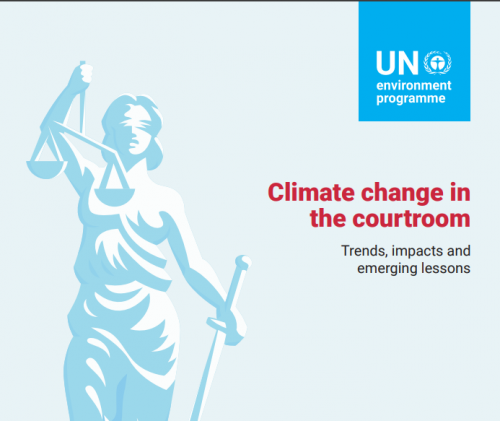
https://sdg.iisd.org/news/unep-report-updates-on-climate-litigation-tren...
The UN Environment Programme (UNEP) and the Sabin Center for Climate Change Law at Columbia University issued a report examining key trends in climate change litigation, its impacts, and emerging lessons. The report offers updates on the number and types of tracked climate change cases and provides an overview of landmark international climate litigation in the period 2023-2025.
Titled, ‘Climate Change in the Courtroom: Trends, Impacts and Emerging Lessons,’ the report is the fourth in a series launched in 2017. It draws information from the Climate Change Litigation Databases maintained by the Sabin Center.
The report reveals that climate litigation, which it defines as “cases that raise material issues of law or fact relating to climate change mitigation, adaptation, or the science of climate change,” has been on the rise since 1986 when the first climate case was recorded. As of June 2025, 3,099 climate change cases have been filed in 55 jurisdictions and 24 international or regional courts, tribunals, and quasi-judicial bodies. The majority of these cases (1,986) were filed in the US, with Australia, Brazil, the UK, and Germany each having more than 51 cases. While only 305 cases were filed in the Global South, its share of climate litigation is steadily growing, according to the report.
The report notes that climate litigation mainly aims to inform legislation or policies, frame human rights and obligations relating to climate change, or redress climate harms. Landmark international litigation spotlighted in the report includes:
- The 2024 advisory opinion by the International Tribunal for the Law of the Sea (ITLOS) clarifying State obligations under the UN Convention on the Law of the Sea (UNCLOS) to prevent, reduce, and control marine pollution as a result of human-induced climate change;
- The 2025 petition by the Pan African Lawyers Union (PALU) with the African Court of Human and Peoples’ Rights (AfCHPR), seeking an advisory opinion on African States’ human rights obligations in the context of climate change;
- The 2025 ruling by the Inter-American Court of Human Rights (IACtHR) on State obligations in addressing the climate emergency under international human rights law, which clarified that the right to a healthy environment is protected under the American Convention on Human Rights (ACHR); and
- The 2025 advisory opinion by the International Court of Justice (ICJ), reaffirming States’ obligations with respect to climate change – and legal consequences of their breach.
Domestic climate litigation discussed in the report includes cases against governments focusing on “climate rights,” domestic enforcement, keeping fossil fuels in the ground, and climate migration. Cases against corporations address, inter alia, the corporate duty to mitigate emissions, corporate liability for failure to adapt, climate damages, loss and damage, responsibility of financial institutions, climate-related disclosures, and greenwashing.
Domestic climate litigation discussed in the report includes cases against governments focusing on “climate rights,” domestic enforcement, keeping fossil fuels in the ground, and climate migration. Cases against corporations address, inter alia, the corporate duty to mitigate emissions, corporate liability for failure to adapt, climate damages, loss and damage, responsibility of financial institutions, climate-related disclosures, and greenwashing.
The report further finds that amid growing “pro-climate” litigation, “anti-climate” cases are also climbing. Such cases usually seek “to delay or dismantle climate-related measures or actions” and include cases against federal states, corporations, individuals, and non-governmental organizations (NGOs).
Among the lessons offered by climate change litigation, the report highlights:
- Courts offer a mechanism to deter backsliding, holding governments to account, and can accelerate the adoption and implementation of ambitious mitigation and adaptation strategies.
- The use of human rights law to frame state obligations on climate change is becoming common.
- Strategic lawsuits, even before a final ruling, can prompt institutional reform and put pressure on legislatures.
- Litigation shapes how societies perceive climate risk, responsibility, and the timelines for necessary action.
- The absence of strong enforcement frameworks or institutions could limit the practical impact of court decisions in climate cases.
The report was published on 3 October 2025. [Publication: Climate Change in the Courtroom: Trends, Impacts and Emerging Lessons] [Key Messages] [Publication Landing Page] [UNEP Press Release] [SDG Knowledge Hub Story on 2023 Report]
* * *
This news story is part of a project that seeks to raise awareness and build momentum and knowledge around the ICJ advisory opinion on obligations of States in respect of climate change and to promote a better understanding of the implications of the advisory opinion among sustainable development decision makers.









